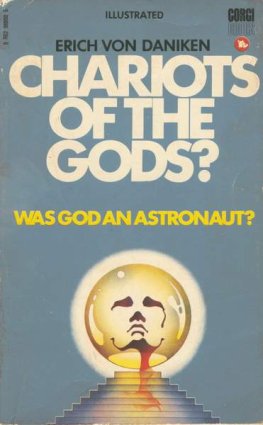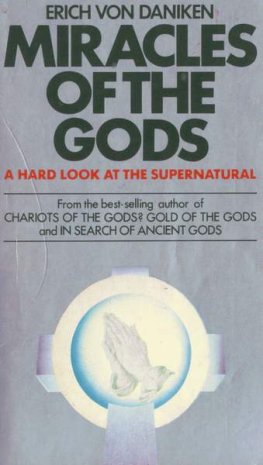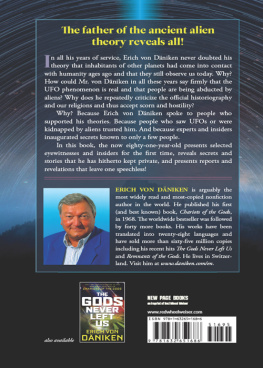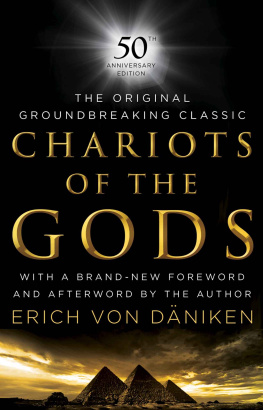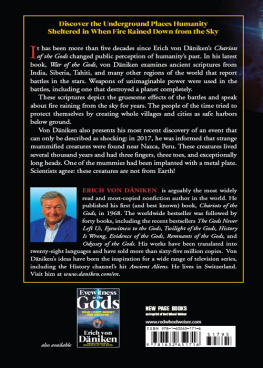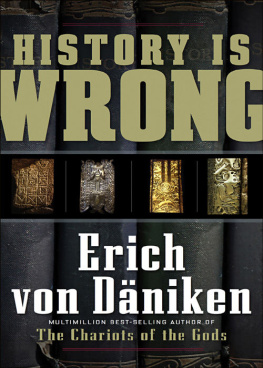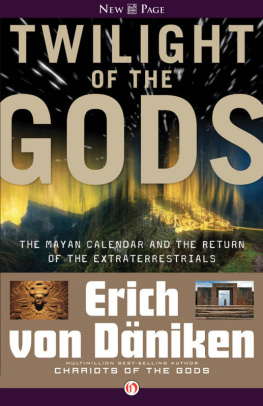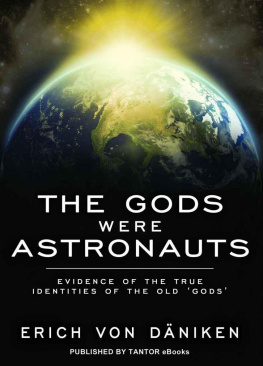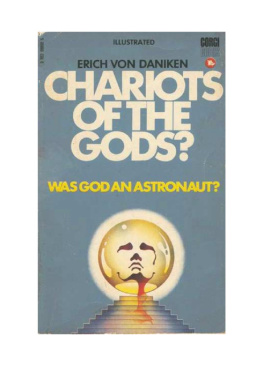Erich Daniken - Chariots of the Gods
Here you can read online Erich Daniken - Chariots of the Gods full text of the book (entire story) in english for free. Download pdf and epub, get meaning, cover and reviews about this ebook. genre: Science. Description of the work, (preface) as well as reviews are available. Best literature library LitArk.com created for fans of good reading and offers a wide selection of genres:
Romance novel
Science fiction
Adventure
Detective
Science
History
Home and family
Prose
Art
Politics
Computer
Non-fiction
Religion
Business
Children
Humor
Choose a favorite category and find really read worthwhile books. Enjoy immersion in the world of imagination, feel the emotions of the characters or learn something new for yourself, make an fascinating discovery.
- Book:Chariots of the Gods
- Author:
- Genre:
- Rating:5 / 5
- Favourites:Add to favourites
- Your mark:
- 100
- 1
- 2
- 3
- 4
- 5
Chariots of the Gods: summary, description and annotation
We offer to read an annotation, description, summary or preface (depends on what the author of the book "Chariots of the Gods" wrote himself). If you haven't found the necessary information about the book — write in the comments, we will try to find it.
Chariots of the Gods — read online for free the complete book (whole text) full work
Below is the text of the book, divided by pages. System saving the place of the last page read, allows you to conveniently read the book "Chariots of the Gods" online for free, without having to search again every time where you left off. Put a bookmark, and you can go to the page where you finished reading at any time.
Font size:
Interval:
Bookmark:
Erich Von Daniken
Chariots of the Gods
Introduction
It took courage to write this book, and it will take courage to read it. Because its theories and proofs do not fit into the mosaic of traditional archaeology, constructed so laboriously and firmly cemented down, scholars will call it nonsense and put it on the Index of those books which are better left unmentioned. Laymen will withdraw into the snail-shell of their familiar world when faced with the probability that finding out about our past will be even more mysterious and adventurous than finding out about the future.
Nevertheless one thing is certain. There is something inconsistent about our past, that past which lies thousands and millions of years behind us. The past teemed with unknown gods who visited the primaeval earth in manned space-ships. Incredible technical achievements existed in the past. There is a mass of know-how which we have only partially rediscovered today.
There is something inconsistent about our archaeology! Because we find electric batteries many thousands of years old. Because we find strange beings in perfect space suits with platinum fasteners. Because we find numbers with fifteen digitssomething not registered by any computer. But how did these early men acquire the ability to create these incredible things?
There is something inconsistent about our religion. A feature common to every religion is that it promises help and salvation to mankind. The primitive gods gave such promises, too. Why didn't they keep them? Why did they use ultra-modern weapons on primitive peoples? And why did they plan to destroy them?
Let us get used to the idea that the world of ideas which has grown up over the millennia is going to collapse. A few years of accurate research has already brought down the mental edifice in which we had made ourselves at home. Knowledge that was hidden in the libraries of secret societies is being rediscovered. The age of space travel is no longer an age of secrets. Space travel, which aspires to suns and stars, also plumbs the abysses of our past for us. Gods and priests, kings and heroes emerge from the dark chasms. We must challenge them to deliver up their secrets, for we have the means to find out all about our past, without leaving any gaps, if we really want to.
Modern laboratories must take over the work of archaeological research.
Archaeologists must visit the devastated sites of the past with ultra-sensitive measuring apparatus.
Priests who seek the truth must again begin to doubt everything that is established.
The gods of the dim past have left countless traces which we can read and decipher today for the first time because the problem of space travel, so topical today, was not a problem, but a reality, to the men of thousands of years ago. For I claim that our forefathers received visits from the universe in the remote past. Even though I do not yet know who these extra-terrestrial intelligences were or from which planet they came, I nevertheless proclaim that these 'strangers' annihilated part of mankind existing at the time and produced a new, perhaps the first, homo sapiens.
This assertion is revolutionary. It shatters the base on which a mental edifice that seemed to be so perfect was constructed. It is my aim to try to provide proof of this assertion.
My book would not have been written without the encouragement and collaboration of many people. I should like to thank my wife, who has seen little of me at home during the last few years, for her understanding. I should like to thank my friend Hans Neuner, my travelling companion for many thousands of miles, for his unfailing and valuable help. I should like to thank Dr Stehlin and Louis Emrich for their continuous support. I should like to thank all the NASA personnel at Houston, Cape Kennedy and Huntsville who showed me round their magnificent scientific and technical research centres. I should like to thank Professors Dr Werhner von Braun, Dr Willy Ley and Bert Slattery. I should like to thank all the countless men and women around the globe whose practical help, encouragement and conversation made this book possible.
Erich Von Daniken
-----------------------
Chapter One - Are There Intelligent Beings In The Cosmos?
Is it conceivable that we world citizens of the twentieth century are not the only living beings of our kind in the cosmos? Because there is no homunculus from another star on display in a museum for us to visit, the answer 'Our earth is the only star with human beings' still seems to be legitimate and convincing. But the forest of question marks grows and grows as soon as we make a careful study of the fact resulting from the latest discoveries and research work.
On a clear night the naked eye can see about 4,500 stars, so the astronomers say. The telescope of even a small observatory makes nearly two million stars visible and a modern reflecting telescope brings the light from thousands of millions more to the viewer-specks of light in the Milky Way. But in the colossal dimensions of the cosmos our stellar system is only a tiny part of an incomparably larger stellar system-of a cluster of Milky Ways, one might say, containing some twenty galaxies within a radius of 1 1/2 million light years (1 light year = the distance travelled by light in a year, i.e. 186,000 x 60 x 24 x 365 miles). And even this vast number of stars is small in comparison with the many thousands of spiral Nebulae disclosed by the electronic telescope. Disclosed up to the present day, I should emphasise, for research of this kind is only just beginning.
The astronomer Harlow Shapley estimates that there are some 10 <20> stars within the range of our telescopes. When Shapley associates a planetary system with only one in a thousand stars, we may assume that it is a very cautious estimate. If we continue to speculate on the basis of this estimate and suspect the necessary conditions for life on only one star in a thousand, this calculation still gives a figure of 10 <14>. Shapley asks: how many stars in this truly 'astronomical' figure have an atmosphere suitable for life? One in a thousand? That would still leave the incredible figure of 10 <11> stars with the prerequisites for life. Even if we assume that only every thousandth planet out of this figure has produced life, there are still 100 million planets on which we can speculate that life exists. This calculation is based on telescopes using the techniques available today, but we must not forget that these are constantly being improved.
If we follow the hypothesis of the biochemist Dr S Miller, life and the conditions essential for life may have developed more quickly on some of these planets than on Earth. If we accept this daring assumption, civilisations more advanced than our own could have developed on 100,000 planets.
Professor Dr Willy Ley, the well-known scientific writer and friend of Wernher von Braun, told me in New York: 'The estimated number of stars in our Milky Way alone amounts to 30 milliards. The assumption that our Milky Way contains at least 18 milliard planetary systems is considered admissible by present-day astronomers. If we now try to reduce the figures in question as much as possible and assume that the distances between planetary systems are so regulated that only in one case in a hundred does a planet orbit in the ecosphere of its own sun, that still leaves 180 million planets capable of supporting life. If we further assume that only one planet in a hundred that might support life actually does so, we should still have the figure of 1-8 million planets with life. Let us further suppose that out of every hundred planets with life there is one on which creatures with the same level of intelligence as homo sapiens live. Then even this last supposition gives our 'Milky Way the vast number of 18,000 inhabited planets.'
Font size:
Interval:
Bookmark:
Similar books «Chariots of the Gods»
Look at similar books to Chariots of the Gods. We have selected literature similar in name and meaning in the hope of providing readers with more options to find new, interesting, not yet read works.
Discussion, reviews of the book Chariots of the Gods and just readers' own opinions. Leave your comments, write what you think about the work, its meaning or the main characters. Specify what exactly you liked and what you didn't like, and why you think so.

